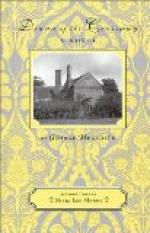Diana regained her happy composure at Copsley. She had, as she imagined, no ambition. The dulness of the place conveyed a charm to a nature recovering from disturbance to its clear smooth flow. Air, light, books, and her friend, these good things she had; they were all she wanted. She rode, she walked, with Sir Lukin or Mr. Redworth, for companion; or with Saturday and Sunday guests, Lord Larrian, her declared admirer, among them. ‘Twenty years younger!’ he said to her, shrugging, with a merry smile drawn a little at the corners to sober sourness; and she vowed to her friend that she would not have had the heart to refuse him. ‘Though,’ said she, ’speaking generally, I cannot tell you what a foreign animal a husband would appear in my kingdom.’ Her experience had wakened a sexual aversion, of some slight kind, enough to make her feminine pride stipulate for perfect independence, that she might have the calm out of which imagination spreads wing. Imagination had become her broader life, and on such an earth, under such skies, a husband who is not the fountain of it, certainly is a foreign animal: he is a discordant note. He contracts the ethereal world, deadens radiancy. He is gross fact, a leash, a muzzle, harness, a hood; whatever is detestable to the free limbs and senses. It amused Lady Dunstane to hear Diana say, one evening when their conversation fell by hazard on her future, that the idea of a convent was more welcome to her than the most splendid marriage. ‘For,’ she added, ’as I am sure I shall never know anything of this love they rattle about and rave about, I shall do well to keep to my good single path; and I have a warning within me that a step out of it will be a wrong one—for me, dearest!’
She wished her view of the yoke to be considered purely personal, drawn from no examples and comparisons. The excellent Sir Lukin was passing a great deal of his time in London. His wife had not a word of blame for him; he was a respectful husband, and attentive when present; but so uncertain, owing to the sudden pressure of engagements, that Diana, bound on a second visit to The Crossways, doubted whether she would be able to quit her friend, whose condition did not allow of her being left solitary at Copsley. He came nevertheless a day before Diana’s appointed departure on her round of visits. She was pleased with him, and let him see it, for the encouragement of a husband in the observance of his duties. One of the horses had fallen lame, so they went out for a walk, at Lady Dunstane’s request. It was a delicious afternoon of Spring, with the full red disk of sun dropping behind the brown beech-twigs. She remembered long afterward the sweet simpleness of her feelings as she took in the scent of wild flowers along the lanes and entered the woods jaws of another monstrous and blackening experience. He fell into the sentimental vein, and a man coming from that heated London life to these glorified woods, might




